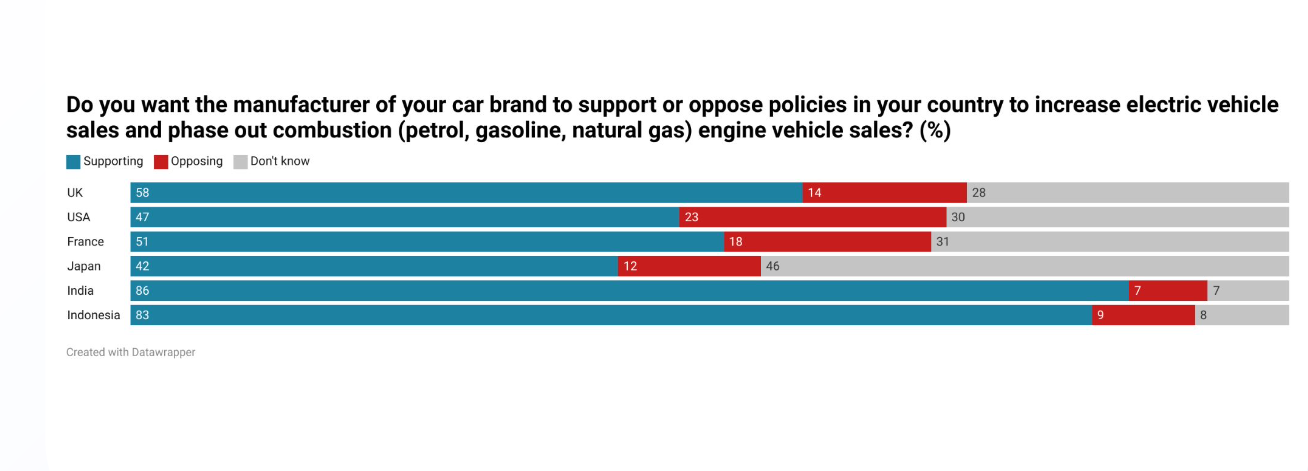Sign up for daily news updates from CleanTechnica on email. Or follow us on Google News!
The transition to electric vehicles is crucial to tackling climate change. Together with a big reduction in private car journeys via better public transport and cycling infrastructure, the replacement of combustion engines with EVs powered by renewable energy can take a big chunk out of that fifth of global CO2 emissions that come from the transport sector.
The role of the big incumbent automakers — firms like VW, Ford, Hyundai, and Toyota — is critical to how fast we transition to EVs, and how fast we decarbonize this huge sector. To date it’s been a two-sided affair. Big Auto has invested billions of dollars in EV technology and production plants to try to catch up with Tesla, and overall EV sales are continuing to rise this year, albeit at a slightly less blistering pace.
However at the same time, many incumbent automakers are lobbying behind closed doors to weaken pro-EV climate regulations, in an attempt to prolong the lifespan of their existing profit center of making millions of combustion engine vehicles each year. The assumption to-date has been that customers don’t really mind such activity — they just care about the car itself, not what the company that makes it is up to.
New opinion polling challenges that assumption. Dynata, on behalf of think tank New AutoMotive, surveyed a representative sample of 1,000 drivers in each of six countries — USA, UK, France, India, Indonesia, and Japan — to get insights on consumer attitudes towards automakers’ role in the EV transition. A majority of drivers in all countries said they favor companies that support stronger polices to tackle climate change, and a majority in all countries apart from Japan said they would even avoid buying a car from a company that lobbied against climate change policy.

More specifically, a majority of drivers in the UK (58%), France (51%), India (86%), and Indonesia (83%) want their own car brand to actively support policies to increase EV sales and phase out Internal Combustion Engine (ICE) car sales. Less drivers in the US and Japan felt this way, but they still outnumbered drivers who wanted their car brand to oppose such policies by more than two to one.
“These results should give many of the largest car manufacturers pause for thought,” said Ben Nelmes, CEO of New AutoMotive, commenting on the poll. “Motorists are increasingly conscious of the impact that cars have on the environment, and they want cleaner cars. Advocating for climate policies to be weakened or watered down not only carries environmental risks, but reputational and financial risks, too.”
Car companies with an eye on the future might find the generational aspect of the data interesting. In most countries surveyed, young (18-34 years) drivers were more likely to want their car brand to support climate policy than older drivers (55 years+). Investors are also likely to be interested in what these results tell us about the likely shape of the energy transition.
A scenario of merely linear growth of EV sales over time assumes that incumbent combustion engine manufacturers will continue to enjoy strong positive brand associations, even as their product becomes less mainstream in the market, and public opinion continues to shift in favor of bolder action to protect society as climate change worsens. But if younger car buyers are put off brands that lobby against climate action more than older car buyers, is that going to happen? At what point will incumbent carmakers judge that the brand damage costs of lobbying against EVs outweigh the profits from prolonging the life of combustion engines? If that point is reached, it could trigger an accelerated, non-linear second half of the transition to EVs, as industry, governments, and consumers all align.
If this all sounds a bit hypothetical, let’s turn to a concrete example. This month is the annual shareholder meeting of the world’s largest carmaker, Toyota. Shareholders will be voting on a resolution to require more transparency on Toyota’s lobbying stance on climate policy. The company says its policy stance is aligned with the Paris Agreement. Corporate watchdog InfluenceMap says that “Toyota “continues to have active, negative engagement, both directly, and indirectly through its industry associations, on key automotive climate policies in multiple regions in 2023-24.” One of the investors’ concerns is that lobbying against EVs and climate policies risks damaging Toyota’s valuable brand. Until now, we’ve arguably never seen concrete evidence either way — do drivers actually care about this topic or not?
The new Dynata opinion poll results provide the first real evidence that drivers do care — a lot — about the broader role their brand is playing in tackling climate change. Even current Toyota drivers, with broadly favorable brand perceptions of the company, seem to want the company to change course on its lobbying stance. In three countries, enough drivers identified themselves as Toyota drivers to offer statistically significant results: US, Japan, and Indonesia. In all three countries, many more Toyota drivers wanted the company to support policies to increase EV sales and phase out new ICE sales than to oppose such policies (US: 49% versus 20%, Japan 43% vs 12%, Indonesia 84% vs 8%).
There is a positive opportunity for the car industry in all this, and data supports the idea that drivers are actually ahead of the industry on EVs. A large majority of drivers in major emerging markets like India and Indonesia say they would prefer to buy an EV as their next vehicle. While many drivers say they have considered switching away from their current car brand due to a lack of EV options, it appears that if automakers can bring a bigger range of affordable EVs to the market, buyers are ready and waiting.
Drivers in many cases have higher expectations than auto companies of how fast the EV transition will progress, and what share of EVs automakers will have to sell in order to remain competitive in the market. For example, drivers surveyed tended to think their own car brand should aim for around 40% to 50% EV sales by 2030, depending on country. The high favorability ratings given to brands perceived as leading on the EV transition, both in terms of their own market share, and support towards ambitious climate policy, should be seen as an opportunity, not a threat, by carmakers.
While the road may be rocky at times, brand value in the auto industry will be increasingly tied to the EV transition, and brands that show leadership on this front can thrive in a changing climate.
Have a tip for CleanTechnica? Want to advertise? Want to suggest a guest for our CleanTech Talk podcast? Contact us here.
Latest CleanTechnica.TV Videos
CleanTechnica uses affiliate links. See our policy here.




.jpg)